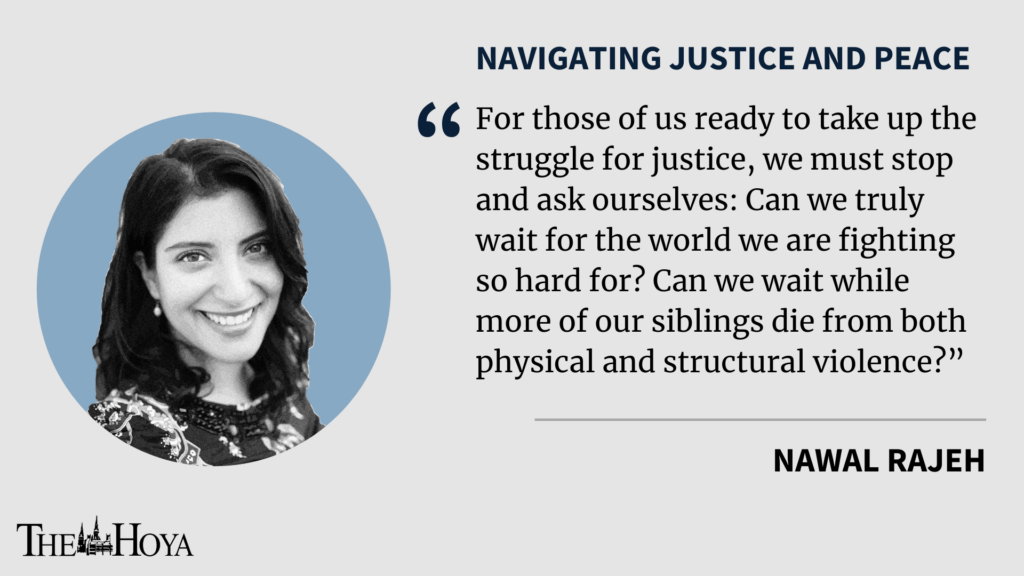To say that this year has been a year of painful reckoning is an understatement. Global health disparities, racial injustice, divisive rhetoric and violence have marked this year unlike any in recent memory. Massive peaceful protests in more than 2,000 U.S. cities during a pandemic show that a new wave of consciousness is here. Community organizer and civil rights movement leader Fannie Lou Hamer once said,“ … America is upset and the only way to bring about a change is to upset it more.” Being awake to the injustices happening all around is upsetting, and if we choose, also has the power to be transformative; we cannot unsee this year.
For those of us ready to take up the struggle for justice, we must stop and ask ourselves: Can we truly wait for the world we are fighting so hard for? Can we wait while more of our siblings die from both physical and structural violence? Can we wait while we fear for the health and safety of our loved ones? The answer is a resounding no. Peace is not a facade of harmony — it requires justice, truth, reparation and reconciliation.
Fr. Patrick Smith, pastor of the historic St. Augustine’s Catholic Church in Washington, D.C., often says that “if there is a problem of darkness in the world, then the problem is not the darkness, the problem is the light.” We know that in times of deep darkness, of collective pain, like the ones we face now, people called to be the light must come and interrupt that darkness, whether it be with a flicker or a flame.
This election has shown us even more starkly the work that is ahead of us. Our elected officials cannot do the work that we must each, as people called to be light, do in our lives and in our communities. We will miss a great opportunity to create change if we allow ourselves to get too comfortable now. This moment calls for our own courageous leadership, and I would like to offer ideas for what we can do both individually and collectively to interrupt the darkness we face.
First, let us tell new stories. When I was an undergraduate student studying peace, the professor who changed my world forever had a class and syllabus full of real stories from around the world of people who dared to declare that the time for peace was now. Their stories enlightened me to the endless possibilities of our human capability to create. We need to study and seek out these stories and share them with others as a way to call forth a world filled with justice, peace, equity and love.
It is time we all work for racial justice. I am the daughter of immigrants who fled a homeland plagued by civil war. As a child learning about the brutal history of genocide and slavery in the United States, I felt a sense of relief that my own ancestors were not a part of this horrific story. But as an adult, I now know and believe that the moment anyone sets foot on the soil of this nation, they too inherit this history and must decide on which side they will stand. This history is not confined to the far past; it is an ongoing and unfolding story, as 2020 has shown us. This year, we have watched cell phone footage of too many Black and Brown lives lost to state violence. We have watched BIPOC communities again encounter obstacles to simply cast their vote. While immigrants, non-Black and non-Indigenous POC and other marginalized groups in this nation are no strangers to systemic racism and injustices, we must realize that these systems were not created for us as members of marginalized communities; they have been repurposed for us. The constant struggle for freedom of our Black and Indigenous siblings is the struggle for freedom for us all.
Lastly, I would encourage the students and community members reading this piece to join an organization and build deep relationships. These actions are where our resilience lives. We can do so much more good together than we can apart. Our organizations are where we get to amplify our values and practice for the world to come. They are where we can stop imitating the examples of power in the world and prepare for the world we want by sharing leadership and building consensus so every voice is heard. If we do this, when the world we have fought and prayed for is closer, we will be ready to lead in new ways, armed with new stories, deep relationships and a collective devotion to pursue justice and seek peace for each one of us.
Nawal Rajeh is a community organizer and lecturer for the Justice and Peace Studies program at Georgetown University.










Tyler Smith • Mar 5, 2021 at 11:13 am
Thank you Nawal for the this amazing article.
Arthur Romano • Jan 27, 2021 at 2:49 am
I appreciate the way Nawal makes a clarion call for us to take the vulnerability of this movement and let it move us to reach out to others that are already doing work to transform their communities. Indeed if not now then when?
Ralph E. Moore, Jr. • Nov 13, 2020 at 10:20 am
This is an outstanding, forward thinking article by Peacemaker Nawal Rajeh. Here understanding of history, her appreciation of the power of stories and her call to action are just what we need from leadership in these times.
Nawal deserves our gratitude for her energy, clarity in truth-telling and commitment to the children’s futures.
She should be a regular columnist with the paper, The Hoya.